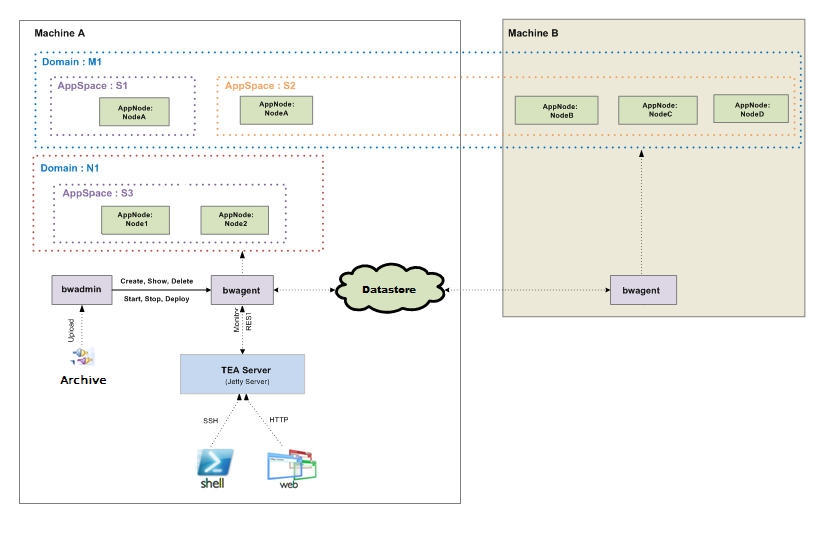Administration Concepts
Applications are deployed into runtime environments and managed using the bwadmin utility. TIBCO Enterprise Administrator can also be used to manage and monitor applications.
TIBCO ActiveMatrix BusinessWorks™ provides a flexible framework that allows you to scale your runtime environment as needed. The runtime provides an option to execute the ActiveMatrix BusinessWorks™ engine so that the risk of a single point of failure when running an application is reduced. The engine is responsible for executing the applications.
Following are the key administrative components:
- An Application Archive is the deployment unit for an application that is generated in TIBCO Business Studio™ for BusinessWorks™.
- A Domain is a logical group that provides an isolated environment for applications and their resources to reside.
- An AppSpace is a group of one or more AppNodes, which are runtime entities that host ActiveMatrix BusinessWorks applications. AppSpaces are contained within a domain. One or more application can be deployed to an AppSpace.
- An AppNode is a runtime entity that hosts applications. AppNodes are contained in an AppSpace.
- The bwagent is a daemon process that runs on every ActiveMatrix BusinessWorks installation. When multiple installations across machines are configured as a network, the bwagents interact with each other using a datastore. They also synchronize the data from the datastore with the local file system.
The bwagent on Machine A is registered with the TIBCO® Enterprise Administrator server. If the registered bwagent becomes unavailable, the connection between the TIBCO Enterprise Administrator server and the agent network is automatically recovered. The bwagent on Machine B is automatically registered with the server.
If the TIBCO® Enterprise Administrator server becomes unavailable, running applications and AppSpaces are not impacted.
The runtime entities manifest as a hierarchical folder structure on the local file system. Every action performed on the runtime entities results in an update to the file system. The location of the default domains folder in the local file system can be changed by editing the BW_HOME/domains/DomainHomes.properties file.
When the runtime entities span across multiple machines, the bwagent synchronizes the data from the datastore with the local file system. The AppNodes that host and execute the applications read their configuration and data only from the local file system, making the file system the source of truth. The bwagents ensure that all AppNodes of an AppSpace access the exact same applications. Within an AppSpace all applications executed by all AppNodes are identical. This ensures that in case of a failure in the communication channel, the runtime is not affected as it refers to the data on the local file system.
When the runtime entities span machines, the bwagent synchronizes the data from the datastore with the local file system. The AppNodes that host and execute the application reads their configuration and data only from the local file system, making the file system the source of truth. The BWAgents ensure that all AppNodes of an AppSpace access the exact same application. Within an AppSpace, the application executed by all AppNodes is identical. This ensures that in case of a failure in the communication channel, the runtime is not affected as it refers to the data on the local file system.
For more information, see TIBCO ActiveMatrix BusinessWorks™ Administration.

